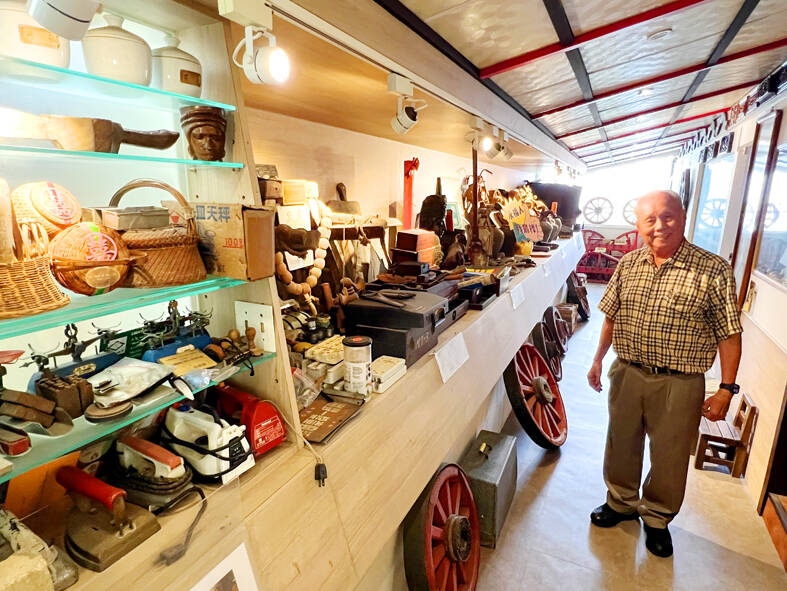Early-childhood education expert Shen Ming-hsien (沈銘賢) has collected thousands of historical artifacts over the past 60 years, providing them as a resource for students at his kindergarten.
Before opening a private kindergarten, Shen studied mechanical engineering at university and studied in the US, eventually earning his doctorate.
Shen later worked at his family’s electrical appliance business and taught classes at university part-time.

Photo: Wang Chun-chung, Taipei Times
With the support of fellow educators, Shen transformed one of his family’s unused factories in eastern Tainan into the Muchun Kindergarten in 1980.
Shen, 78, said his passion for collecting historical items was inspired by his parents, who were educated in Japan.
They meticulously kept all manner of objects from Shen’s childhood — from his umbilical cord to report cards, awards and graduation certificates.
Growing up in that environment, Shen said he developed a keen interest in collecting and history.
He began collecting historical items like farm tools, cutlery, clothes and embroidery from book and antique stores during his time off from school and work, he said.
In 1973, Shen participated in multiple activities organized by Junior Chamber International Taiwan — a nonprofit organization for young people to make positive contributions to their communities — meeting collectors Liu Wen-san (劉文三), Pan Yuan-shih (潘元石) and Chen Ming-liang (陳明亮).
Inspired by them, Shen said he began collecting even more historical artifacts, including two iron-wheeled ox carts, water jars, washbasin stands and bellows, alongside larger items such as a red canopy bed, brick stove and cypress wood bathtub.
He also frequented antique shops, where he acquired Cochin pottery, clay sculptures, guardian lion figurines, floral wood carvings and various plaques, in addition to numerous other pieces salvaged from historical sites, he said.
When an obstetric clinic from the Japanese colonial era was being renovated about 30 years ago, its original baroque-style carvings of pregnant women were slated for disposal.
However, determined not to let this happen, Shen and Pan rushed to the site to rescue the sculptures.
Later, when Shen’s family factory was transformed into a kindergarten, he found a new way to breathe life into history — incorporating intricately carved wooden doors and window frames from his collection into the building’s design, allowing the historical artifacts to become part of everyday life.
His entire collection is stored within his estate, including at the Muchun Kindergarten and Muchun Cultural Museum.
Shen said he organizes his collection thematically, categorizing items under food, clothing, housing, transportation, education and entertainment.
The food category includes everyday items such as bowls, plates and pots, while the clothing category includes traditional garments such as phoenix robes and dudou (肚兜, a traditional Chinese undergarment), he said.
Housing includes traditional floral-patterned doors and windows, canopy beds and stoves, he added.
The transportation category includes items such as ox carts, as well as antique motorcycles and bicycles, he said.
Under education, he includes chamber pots and baby bathtubs, while entertainment includes traditional and modern toys along with coins, stamps and souvenirs from more than 80 countries Shen has visited.
Shen said he intends to gradually donate the artifacts to museums or institutions capable of preserving and publicly displaying them, ensuring their educational value.
Shared enjoyment is more meaningful than solitary appreciation and these objects could inspire others, he said.

Eight restaurants in Taiwan yesterday secured a one-star rating from the Michelin Guide Taiwan for the first time, while three one-star restaurants from last year’s edition were promoted to two stars. Forty-three restaurants were awarded one star this year, including 34 in Taipei, five in Taichung and four in Kaohsiung. Hosu (好嶼), Chuan Ya (川雅), Sushi Kajin (鮨嘉仁), aMaze (心宴), La Vie by Thomas Buhner, Yuan Yi (元一) and Frassi in Taipei and Front House (方蒔) in Kaohsiung received a one-star rating for the first time. Hosu is known for innovative Taiwanese dishes, while Chuan Ya serves Sichuan cuisine and aMaze specializes

STATS: Taiwan’s average life expectancy of 80.77 years was lower than that of Japan, Singapore and South Korea, but higher than in China, Malaysia and Indonesia Taiwan’s average life expectancy last year increased to 80.77 years, but was still not back to its pre-COVID-19 pandemic peak of 81.32 years in 2020, the Ministry of the Interior said yesterday. The average life expectancy last year increased the 0.54 years from 2023, the ministry said in a statement. For men and women, the average life expectancy last year was 77.42 years and 84.30 years respectively, up 0.48 years and 0.56 years from the previous year. Taiwan’s average life expectancy peaked at 81.32 years in 2020, as the nation was relatively unaffected by the pandemic that year. The metric

Taiwan High Speed Rail Corp. (THSRC) plans to ease strained capacity during peak hours by introducing new fare rules restricting passengers traveling without reserved seats in 2026, company Chairman Shih Che (史哲) said Wednesday. THSRC needs to tackle its capacity issue because there have been several occasions where passengers holding tickets with reserved seats did not make it onto their train in stations packed with individuals traveling without a reserved seat, Shih told reporters in a joint interview in Taipei. Non-reserved seats allow travelers maximum flexibility, but it has led to issues relating to quality of service and safety concerns, especially during

A magnitude 5.1 earthquake struck Chiayi County at 4:37pm today, the Central Weather Administration (CWA) said. The hypocenter was 36.3km southeast of Chiayi County Hall at a depth of 10.4km, CWA data showed. There were no immediate reports of damage resulting from the quake. The intensity of the quake, which gauges the actual effect of a seismic event, measured 4 in Chiayi County, Tainan and Kaohsiung on Taiwan's seven-tier intensity scale, the data showed. The quake had an intensity of 3 in Chiayi City and Yunlin County, while it was measured as 2 in Pingtung, Taitung, Hualien, Changhua, Nantou and Penghu counties, the data